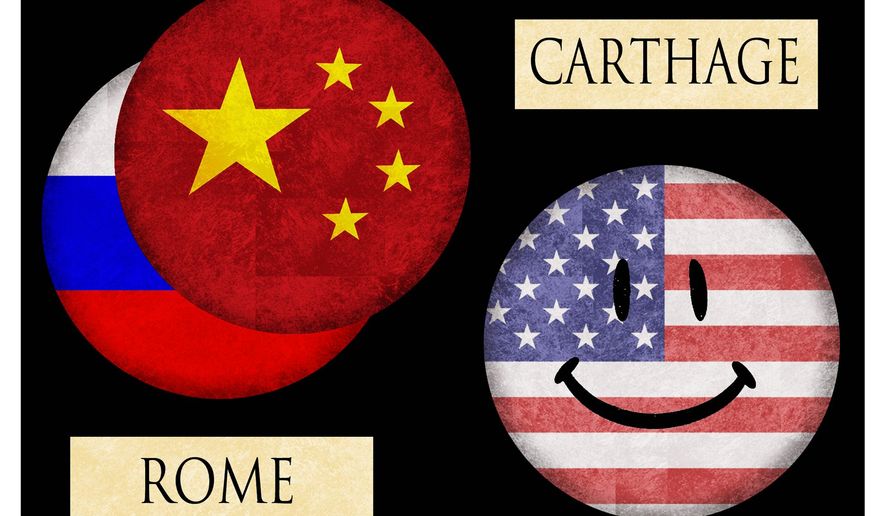OPINION:
The world has radically changed since the Obama-Biden team took the reins 12 years ago.
The Clinton-Bush-Obama presumption that engaging China would yield comity and democratic reforms is obsolete. President Xi firmly believes the compromise of core communist values — absolute party rule and a state orchestrated economy — resulted in the collapse of the Soviet Union.
Emboldened by economic success, China is pushing out in all directions — repressing Hong Kong, a massive naval buildup that challenges the security of U.S. friends in the Pacific, and more broadly, for example, by bullying the U.K. when it is vulnerable during Brexit.
With Joe Biden’s ascent, Beijing is pushing the view that cooperative competition is desirable. However, its responses to the existential threats to civilization — climate change and global pandemics — clearly demonstrate that the Middle Kingdom — as currently organized to serve the Chinese Communist Party — cannot be persuaded into a responsible relationship with Western democracies.
Just last September, Beijing pledged to reach peak CO2 emissions by 2030 and net zero emissions by 2060 — China is the largest source of new greenhouse gases and no possible solution to the planet heating up is possible without those kind of hard commitments. However, China, which already has more than half world’s coal-fired electrical generation, continues to build coal-fired plants and at the December Climate Ambition Summit did not table any meaningful initiatives to keep its promises.
As so many times in trade negotiations, China is buying time to deflect international pressure and build economic advantage by making promises and then slowly reneging through inaction.
Beijing has shown no remorse for failing to warn the world about COVID-19 and has sought to subvert the World Health Organization to avoid culpability. Now it is pressuring Australia and others who support a WHO investigation — or take issue with its treatment of Hong Kong and repression of Muslims in western provinces.
Trade and foreign investment are the cudgels Beijing uses to weaken Western resistance and punish critics. For example, it is investing heavily in Western European companies to access cutting edge technology and in Eastern and Central Europe infrastructure to undermine loyalty to NATO.
Sadly, the Europeans recognize the security threats it poses but show inadequate interest, save the U.K., in aiding America’s response to China’s military buildup in the Indo-Pacific or to limiting Beijing’s investments in Europe.
Digital technologies are rapidly dividing the world into two spheres. One led by China, which preaches the benefits of autocratic government and would be happy to provide acolytes with the tools for [PGM1] the surveillance state and repression. Ably assisted by Russia, it is committed to undermining democracies.
The other is led by America and its advanced allies, who offers technology freely to partners to build wealth, prosperity and mutually respected security.
Great wealth is not required to create considerable mischief these days. Russia’s per capita income is one-fourth that of Germany but the SolarWinds cyberattack has substantially compromised the data security of multiple U.S. agencies and private corporations.
The timing is fortuitous for Russia. Vladimir Putin can test Mr. Biden and is no doubt emboldened by the weak response of the Obama-Biden administration to the Chinese hack of the Office of Personnel Management in 2014.
Mr. Biden’s commitment to multilateralism and shoring up relations with allies is a process not a policy. It must be accompanied by a clear message about the challenges that China and Russia pose, what a credible response will cost Americans and what we expect from our allies.
We cannot trade with China on our current scale without peril and must bear the cost of disengagement. The Germans, for example, cannot be dependent on trade with China and buy natural gas from Russia without helping finance their conventional military and cyber warfare infrastructure.
America must shift its military resources to the Pacific and equip the Navy to inflict fast and certain damage the Chinese don’t dare risk. With populations and GDP exceeding Russia, our NATO allies must pick up the resulting slack in conventional resources in Europe.
This is Rome vs. Carthage — only one side can win. China and Russia see it that way, consequently, so must we.
Mr. Biden’s most comprehensive statements on foreign policy have mostly waxed about the importance of multilateralism, repurposing international trade agreements to serve the protectionist agenda of the hard-left in the Democratic Party and vaguely the importance of stopping China from stealing our technology.
Kumbaya internationalism won’t defend America, but that’s all Mr. Biden is offering.
• Peter Morici, @pmorici1, is an economist and emeritus business professor at the University of Maryland, and a national columnist.




Please read our comment policy before commenting.